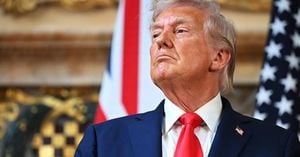On Friday, April 25, 2025, shares of Summit Therapeutics plummeted nearly 40% following a disappointing report from Stat News regarding the survival data from a study on their experimental lung cancer drug, Ivonescimab. The report indicated that the drug only reduced the risk of death by approximately 22%, with a Hazard Ratio of 0.784 after the death of 157 patients. This outcome fell significantly short of analysts' expectations, leading to a temporary suspension of Summit's stock from trading.
Meanwhile, BioNTech, another major player in the biopharmaceutical industry, saw its stock drop by more than 20% on the same day. The decline was attributed to investor concerns regarding BioNTech's similar cancer immunotherapy, Gotistobart, which could face analogous poor results. The downturn for BioNTech was compounded by the fact that its stock had already been under pressure earlier in the month.
Earlier in April, BioNTech's share price had dipped to a low of $81.20, but a visit from Bill Gates and representatives of the Gates Foundation to Mainz, Germany, had sparked a rally. Gates' visit, which included discussions about the development of mRNA vaccines for diseases like tuberculosis and HIV, had initially boosted investor sentiment. However, following the recent negative data from Summit Therapeutics, the mood shifted dramatically.
Summit Therapeutics' stock had been riding high earlier in the week after it disclosed positive phase 3 trial data for Ivonescimab in combination with chemotherapy in a Chinese trial. This news had led to a significant uptick in investor confidence, but the Stat News report reversed that trend, highlighting the volatile nature of biopharmaceutical investments.
According to Truist analyst Asthika Goonewardene, the expectations for Ivonescimab had been set high, with a base estimate of a Hazard Ratio under 0.7 and a worst-case scenario of 0.8. The actual result of 0.784 not only missed those benchmarks but also raised concerns about the drug's efficacy in a competitive market.
As the market reacted to the news, shares of Akeso, a Chinese biotech firm that has developed a similar drug, were up 11.7%. Akeso had recently received FDA approval for its drug, penpulimab-kcqx, which treats nasopharyngeal carcinoma, and had also secured approval in China for Ivonescimab against PD-L1-positive non-small cell lung cancer. The contrasting fortunes of these companies emphasize the fierce competition within the oncology sector.
Investors are now left to navigate a landscape filled with uncertainty. BioNTech's revenue forecast for 2025 is projected to be between 1.7 and 2.2 billion euros, which is below market expectations. Additionally, the company plans to cut up to 1,350 jobs to streamline operations and focus more on research and development, further complicating its financial outlook.
Despite maintaining a Buy rating on BioNTech stock with a target price of $140, Deutsche Bank analyst Emmanuel Papadakis acknowledged the challenges the company faces. BioNTech, known for its mRNA COVID-19 vaccine, has been expanding its bispecific antibody pipeline, including a late-stage monoclonal antibody drug aimed at various cancers. However, with competitors like Akeso gaining ground, BioNTech's future remains uncertain.
As the dust settles from the recent stock turbulence, analysts and investors alike are keeping a close watch on upcoming clinical trial results and market responses. The biopharmaceutical industry is known for its rapid shifts in fortunes, and the recent events serve as a reminder of the inherent risks and rewards involved in biotechnology investments.
In conclusion, the dramatic stock movements of Summit Therapeutics and BioNTech underscore the volatility and unpredictability of the biotech sector, particularly in the competitive field of cancer therapies. Investors are advised to remain cautious and informed as new developments unfold in this fast-paced industry.




